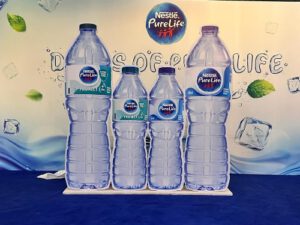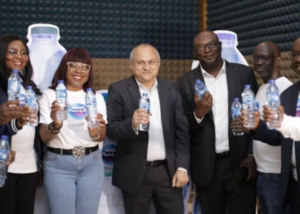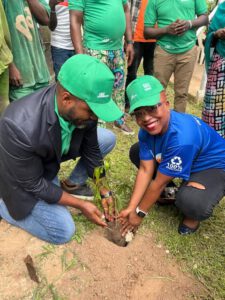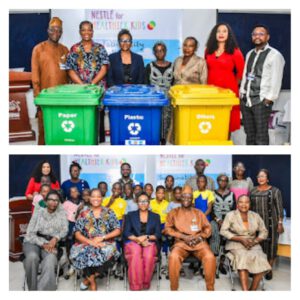From December 2023 to October 2024, Nestlé Nigeria has undertaken five commendable initiatives aimed at environmental sustainability. These efforts are geared towards reducing greenhouse gas emissions, promoting responsible sourcing, and minimizing plastic waste, all supporting the goal of achieving net-zero emissions by 2050 while enhancing global biodiversity. DIVINE IHECHIMEREM writes on the five-fold commitment.
Unveiling of Nestlé Pure Life Bottles Made from 50% Recycled PET

According to the United Nations Environment Programme (UNEP), an estimated 50-60 million single-use plastics, notably straws, cutlery, plastic bottles, and water sachets are thrown onto the streets every day in Lagos.
Most single-use plastics and packaging are produced from fossil fuels and the production process emits vast amounts of greenhouse gasses that drive climate change.
There is therefore the need for a more comprehensive waste collection system and recycling facilities to help drive environmental sustainability.
Recycled polyethylene terephthalate (rPET) plays a vital role in reducing the demand for virgin plastic, which lessens reliance on fossil fuels and minimizes environmental degradation. By diverting plastic waste from landfills and oceans, rPET addresses pollution and supports a circular economy. Its production generally results in fewer greenhouse gas emissions aiding in climate change mitigation. 
Additionally, recycling PET conserves essential natural resources like water and energy. The growing demand for rPET also drives the development of more efficient recycling systems, encouraging innovation and investment in recycling technologies.
It is therefore not only commendable but innovative that Nestlé Nigeria has remained dedicated to increasing the use of rPET across its global brands, with Nigeria being the first to implement rPET in its water brand.
Nestlé Nigeria took significant strides in promoting effective collection, sorting, and recycling systems for PET in the country. This initiative included innovative bottle designs and collaborations with various stakeholders to enhance collection efforts and establish a robust recycling ecosystem.
Last December, Nestlé launched new Pure Life bottles made from 50% recycled rPET, successfully reducing the use of virgin plastics in its bottled water packaging by half.
This achievement marked a key milestone in Nestlé’s journey towards achieving 100% plastics neutrality and support for the circularity of plastics.
Mr. Wassim Elhusseini, MD/CEO of Nestlé Nigeria PLC, emphasized the company’s commitment to plastic recovery. He said: “Since 2018, we’ve worked with partners to ensure that for every ton of plastic we sell, we recover an equal amount.
“In 2021, we partnered with ALEF to aim for a 33% reduction in virgin plastics by 2025. We’re proud to be the first in Nigeria to reach 50% rPET inclusion in our water bottles, thanks to our collaboration with ALEF in producing food-grade rPET locally.”
Mr. Wissam Ramlawi, Managing Director of ALEF Recycling Company, noted the challenges of meeting Nestlé’s rigorous standards. “This journey has required extensive collaboration with Nestlé’s technical and quality assurance teams, as well as our regulators and suppliers, to achieve the desired food-grade quality for rPET.
“I also recognise and commend the regulatory agencies—NESREA, SON and NAFDAC which have ensured compliance to the highest standards.”
At the launch, Joy Abdulahi-Johnson, Category and Marketing Manager for Nestlé Waters said the introduction of 50% rPET aligns with the brand’s mission.
“Our commitment to safety and environmental impact has made this launch possible after nearly two years of diligence. This initiative coincides with a new global identity for Nestlé Pure Life, reflecting our evolution toward sustainability,” she noted.
For Nestlé’ Nigeria, Using rPET enhances brand reputation, ensures regulatory compliance, reduces production costs, differentiates products in the market, fosters innovation, and stabilizes supply chains against fluctuations in virgin material prices.
It was therefore not surprising that Nestlé’received commendation from the regulatory agencies and the government.
Balarabe Abbas Lawal, Honourable Minister for the Environment, commended Nestlé’s efforts, stating: “We support strategies that promote environmental sustainability, alleviate pressure on natural resources, and bolster local economies.”
Minister of Industry, Trade and Investment, Dr. Doris Nkiruka Uzoka-Anite applauded Nestle Nigeria Plc for blazing the trail with the introduction of new bottles, including recycled polyethylene terephthalate (rPET), effectively reducing the use of virgin plastics by 50 per cent.
The minister, who was represented at the official presentation of the new Nestlé Pure Life bottles in Abuja, by the Director for Chemical and Non-Petrochemical Department, Francis Onuorah, said the nation’s industrial policy emphasizes recycling as an alternative to the environmental challenges posed by plastic bottles
She said the Nigerian economy is heavy on oil and gas in terms of petrochemicals and in terms of plastics, adding that when the world is saying phase out plastics or phase out oil vis-a-vis COP28, the importance of oil in the economy should not be underestimated.
At the event, representatives from the National Agency for Food and Drugs Administration and Control (NAFDAC), Standards Organisation of Nigeria (SON), and National Environmental Standards and Regulations Enforcement Agency (NESREA) also spoke glowingly about Nestle’s pathfinding step in recycling plastic bottles.
Following the successful launch of Pure Life bottles made with 50% recycled PET, Nestlé Nigeria continued its commitment to sustainability is in it’s partnership with Ogun State government on sustainable water
A Partnership For Sustainable Water

Another area that Nestlé’ has engaged in environmental sustainability is on water projects.
Nestlé Nigeria is commendably dedicated to community engagement, working closely with local populations to enhance access to clean and safe water. Their sustainable water projects include constructing water infrastructure and establishing community boreholes.
To commemorate World Water Day 2024, themed “Water for Peace,” Nestlé Nigeria, in partnership with the Ogun State Government and the Ogun-Osun Water Basin Authority, organized an event to highlight the importance of water conservation and responsible management practices.
Held in Abeokuta, the event underscored the significance of public-private partnerships (PPP) in driving collective action towards a water-secure future. Nestlé Nigeria has a long-standing commitment to sustainable water practices, successfully reducing its water usage by 48,898 m³ over the past three years.
“We are thrilled to collaborate with the Ogun State Government on World Water Day 2024,” stated Mr. Wassim Elhusseini, CEO of Nestlé Nigeria. “Water is a precious resource, and it is our shared responsibility to protect and conserve it. Through this partnership, we aim to positively impact the environment and the communities we serve.”
Victoria Uwadoka, Head of Corporate Communications, Public Affairs, and Sustainability at Nestlé Nigeria, echoed this commitment, emphasizing the company’s efforts to engage local communities in water conservation initiatives. She said: “We are dedicated to safeguarding water resources for current and future generations. Our collaboration with the Ogun State Government and local stakeholders aims to enhance sustainable water stewardship.
“We have therefore implemented water-saving measures to achieve water savings of 48,898 m3 across our operations in the last three years. In addition, we engage with our local communities and other critical stakeholders in water conservation efforts. Water is a precious resource, and it is our collective responsibility to protect and conserve it,” she added.
In his address, Hon. Ola Oresanya, the Honourable Commissioner for Environment, highlighted that the responsibility for leveraging water for peace extends beyond government to all sectors. “Cooperation among agencies, industry, academia, and individuals is crucial. We must unite around water to build a more stable and prosperous future.”
Nestlé Nigeria is also focused on improving access to clean and safe water through sustainable projects, including the construction of water infrastructure and community boreholes. As part of its collaboration with the Ogun State Government, Nestlé says it will expand efforts to raise awareness about water conservation and educate communities on responsible water use, further enhancing water access and quality.
Building on its partnership with the Ogun State Government for sustainable water management, Nestlé is also actively collaborating with local organizations to plant 1,000 trees, further enhancing environmental stewardship.
Nestle Volunteers Plant 1000 trees

Visualize for a moment the impact of a single tree on the environment: the capacity the capacity to sequester about 20 KG of carbon dioxide annually, production of about 260 pounds of oxygen annually; providing shelter and food for various species, ability to regulate the water cycle, temperature regulation as well as aesthetic and recreational values among other benefits.
You cannot but appreciate the commitment of Nestlé’ and volunteers to environmental stewardship and sustainability with the planting of 1,000 trees at the Nestlé Dairy Demonstration Farm in Abuja in collaboration with CBiIL, a contribution to the global mission of achieving net-zero greenhouse gas (GHG) emissions by 2050.
Undoubtedly, our natural environment is deteriorating everyday due to human activities, such as pollution, deforestation, and climate change. This threatens biodiversity, disrupts ecosystems, and impacts human health and livelihoods.
In a bid to protect our environment, the United Nations set aside June 5 as the World Environmental Day to raise awareness about environmental issues and encourage global action.
To commemorate World Environment Day 2024, Nestlé Nigeria employees under the global employee volunteer platform, Nestlé Cares, joined forces with volunteers from Convention for Business Integrity Innovations Nigeria Limited (CBiIL) to plant 1,000 trees at the Nestlé Dairy Demonstration Farm in the Paikon-Kore grazing reserve, located in the Federal Capital Territory(FCT), Abuja. The initiative aims to mitigate the impact of adverse weather conditions on the farm and enhance climate resilience.
Since its launch in Nigeria in 2019, Nestlé Cares has empowered employees to give back to society by donating their time and skills to create a positive impact on individuals, families, communities, and the environment. Through various initiatives such as beach cleanups, orphanage outreach, market cleanups, and youth mentorship programs, Nestlé employees have demonstrated their dedication to caring for both their communities and the planet. The tree-planting initiative further underscores their commitment to building a sustainable future.
Trees are crucial as natural carbon sinks, capable of absorbing around 20 kg of carbon dioxide each year, thereby aiding in carbon sequestration. Planting 1,000 trees at the dairy demonstration farm serves a dual purpose: enhancing ecosystem resilience and acting as windbreaks to mitigate adverse weather conditions, thereby protecting the animals on the farm. This aligns with the theme of World Environment Day 2024, focusing on land restoration, desertification, and drought resilience, while supporting Nestlé’s global goal of achieving net-zero greenhouse gas emissions by 2050.
During the tree-planting ceremony, Victoria Uwadoka, Corporate Communications, Public Affairs, and Sustainability Lead at Nestlé Nigeria, emphasized the event’s importance. She stated, “Every year, hundreds of Nestlé employees across the country dedicate their time and talents to initiatives that positively impact local communities and the planet. By planting 1,000 trees today, we collectively affirm our commitment to climate action, both individually and as one Nestlé. This marks the start of more ambitious tree-planting campaigns as we accelerate efforts to enhance climate change resilience in our communities. We are grateful for the volunteers from our dairy development program implementation partner, CBiIL, as well as representatives from the Department of Animal Husbandry Services of the Federal Capital Territory Administration (FCTA) who are planting trees with us today.”
Hajia Umma Abubakar, Director of Animal Husbandry Services at FCTA, expressed her support, stating, “We are excited to witness the collaborative efforts of Nestlé Nigeria and CBiIL in planting 1,000 trees at the Nestlé Dairy Demonstration Farm in the Paikon-Kore grazing reserve. This initiative aligns seamlessly with our vision for environmental conservation and highlights the power of collective action in fostering a sustainable future. The trees planted today will not only help mitigate climate change but also benefit livestock. We commend Nestlé Nigeria and its partners for their commitment to climate action and look forward to future collaborations in environmental conservation.”
As part of its broader sustainability efforts, Nestlé not only engages in tree planting initiatives but also educates the next generation.
137 Children Trained in Environmental Sustainability

Few days after Nigerian children celebrated Children’s Day, Nestlé Nigeria engaged 137 children in the sustainability training across five primary schools within Ilupeju Lagos on environmental sustainability as part of its Nestlé for Healthier Kids (N4HK) initiative.
This is aimed at helping 50 million children lead healthier lives by 2030 by promoting informed choices for a sustainable future.
Already, in Nigeria, this programme has educated over 8,000 children on healthy nutrition, active lifestyles, hygiene, and sustainability.
The training titled “Sustainability Training for Kids,” focused on raising awareness about climate change and fostering environmental responsibility from a young age.
Victoria Uwadoka, Nestlé Nigeria’s lead for Corporate Communications, Public Affairs, and Sustainability, emphasized the importance of nurturing a generation committed to sustainability.
She said: “By instilling a sense of environmental responsibility at an early age, we are nurturing a generation that will actively contribute to a more sustainable future ”
She acknowledged the collaboration with the International Climate Change Development Initiative (ICCDI) and the Lagos State Universal Basic Education Board (UBEB) in this regard.
Olumide Idowu, founder of ICCDI, described the initiative as a crucial step in developing children’s understanding of their environmental impact, promoting sustainable habits and empowering them to advocate for positive change.
Titi Oshodi, the Special Adviser to the Governor of Lagos State on circular economy, highlighted the significance of health and well-being for children, commending the role of the programme in fostering informed choices and sustainable practices. She expressed gratitude for Nestlé’s commitment to creating a healthier future for the next generation.
This commitment aligns seamlessly with the launch of Golden Morn’s new sustainable packaging.
A New Packaging For Golden Morn

Photo: (L-R) Omofasa Orhiunu, Category Manager Dairy; Shakiru Lawal, Country HR Manager; Victoria Uwadoka, Corporate Communications Public Affairs and Sustainability Lead and Boladale Odunlami, Commercial Manager, all of Nestle Nigeria Plc. during the Nestle’s Golden Morn New Package launch in Lagos
At the rear of the five-fold commitment was the unveiling in August, of a new sustainable packaging designed for Nestlé’s popular breakfast cereal, Golden Morn. This was a significant step in the brand’s commitment to environmental responsibility and nutritious food production. It aligns with Nestlé’s global goal of ensuring that over 95% of its plastic packaging is recyclable by 2025.
Wassim Elhusseini, Managing Director of Nestlé Nigeria, speaking in this initiative, emphasized the dual responsibility of the company: delivering nutritious products while safeguarding the planet. “Today, over 80% of all Nestlé’s packaging in Nigeria is optimized for recycling. We are pleased to introduce Golden Morn’s upgraded packaging, moving from aluminum foil to a design that prioritizes recyclability,” he stated.
Golden Morn, a staple in Nigerian households for over 38 years, is made from locally sourced maize and soya, and fortified with essential vitamins and minerals. The new 100% recyclable laminate packaging not only enhances the product’s environmental credentials but also retains the familiar taste and nutritional benefits that consumers have come to trust. 
Mr. Omofasa Orhiunu, Category Manager for Dairy also highlighted the brand’s purpose-driven approach: “Golden Morn is dedicated to nourishing families across Nigeria while protecting the planet for future generations.” He reaffirmed the commitment to local sourcing, ensuring quality ingredients that support the local economy and empower farmers.
The new design features vibrant colors and updated graphics that showcase Golden Morn’s key ingredients and health benefits, enhancing its visual appeal while promoting sustainability.
This initiative not only reflects Nestlé Nigeria’s dedication to innovation but also its responsiveness to evolving consumer preferences. By enhancing both the aesthetic and environmental impact of Golden Morn’s packaging, Nestlé demonstrates a robust commitment to sustainability and quality in the food industry.